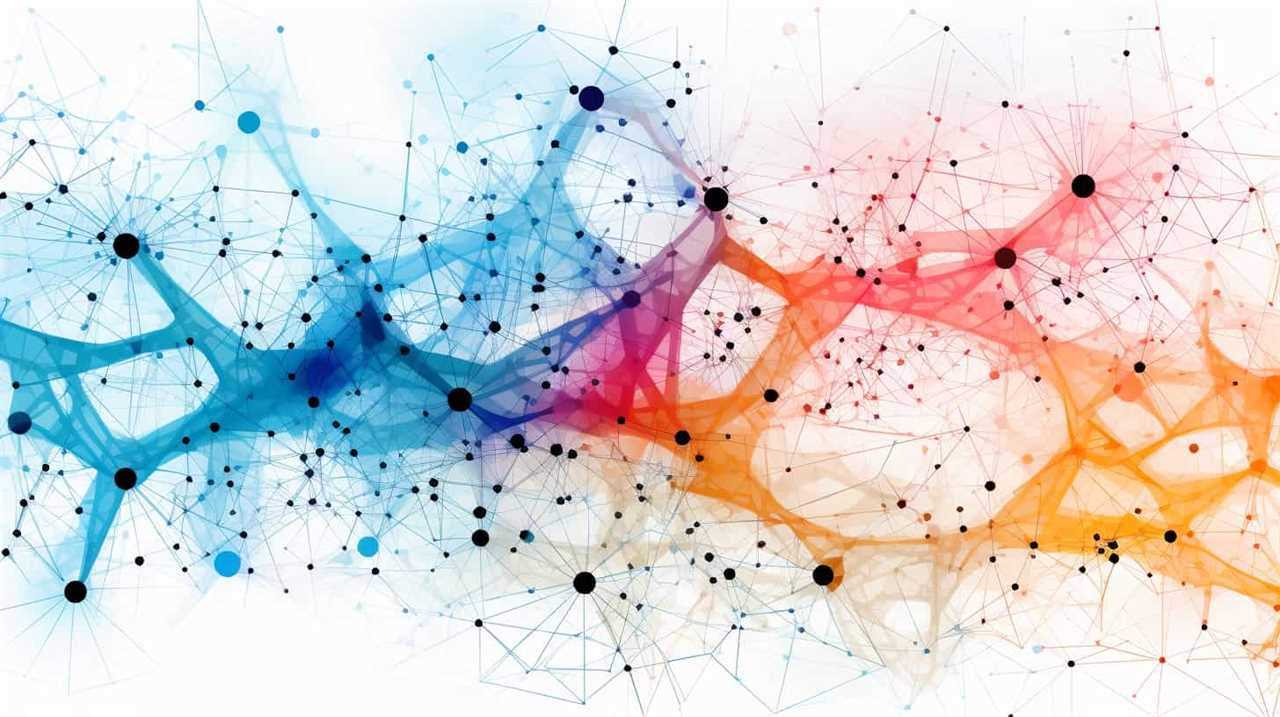As we move forward into the future of AI, we are facing a crucial moment in terms of safeguarding data.
In this article, we will navigate the intricate landscape of safeguarding data in the realm of artificial intelligence. By unraveling the complexities of GDPR and exploring key principles, we will shed light on transparency, consent, and the minimization of data.
Join us as we unveil the path to ensuring compliance and preserving the rights of data subjects in this rapidly evolving AI era.
Key Takeaways
- GDPR compliance is crucial in AI implementation to protect the rights and freedoms of individuals.
- Key principles of data protection in AI include purpose limitation, transparency, data minimization, accuracy, and accountability.
- Transparency in AI data processing ensures fairness, explainability, auditability, and access to information for individuals.
- Obtaining informed consent in AI data collection is complex but necessary to address ethical implications.
GDPR and AI: Ensuring Compliance
As we delve into the intersection of GDPR and AI, it’s crucial to ensure that we comply with the data protection regulations. The impact and challenges of GDPR on AI implementation can’t be underestimated.

GDPR aims to protect the rights and freedoms of individuals by regulating the processing of personal data. When it comes to AI, which relies heavily on data, it becomes imperative to navigate the complexities of GDPR.
Practical implementation of GDPR in AI requires a thorough understanding of its principles and provisions. Consent, data minimization, and purpose limitation are just a few key aspects that need to be considered. Additionally, ensuring transparency, accountability, and the rights of data subjects are essential in meeting GDPR requirements.
Key Principles of Data Protection in AI
Navigating the intersection of GDPR and AI, we prioritize understanding and implementing the key principles of data protection.
In the realm of AI, where vast amounts of personal data are processed, it’s crucial to adhere to these principles to ensure the privacy and security of individuals.

The first key principle is purpose limitation, which requires that personal data is collected and processed for specific, legitimate purposes.
Transparency is another important principle, ensuring that individuals are informed about the processing of their data.
Additionally, data minimization emphasizes the need to limit the collection and storage of personal data to what’s necessary.
Finally, the principle of accuracy and accountability mandates that organizations maintain accurate and up-to-date data while taking responsibility for its protection.

Transparency in AI Data Processing
Moving forward in our exploration of data protection in AI, we now delve into the crucial aspect of transparency in AI data processing. Transparency plays a vital role in ensuring fairness in algorithms and addressing bias in AI data processing. By providing visibility into the inner workings of AI systems, transparency enables users and stakeholders to understand how decisions are being made and to identify potential biases or discriminatory practices. To illustrate this concept, consider the following table:
| Transparency Measures | Description | Benefits |
|---|---|---|
| Explainability | Providing clear explanations of AI decisions | Increased trust and accountability |
| Auditability | Allowing for independent audits of AI systems | Detection and mitigation of biases |
| Access to Information | Granting individuals access to their personal data used in AI systems | Empowerment and control over personal information |
Consent and Data Collection in AI
When it comes to AI data collection, ethical considerations are paramount. It’s crucial to ensure that data is collected in a manner that respects individuals’ privacy and maintains their autonomy.
However, obtaining informed consent in the context of AI can be challenging due to the complexity of the technology and the potential for unforeseen uses of collected data. We must carefully navigate these challenges to protect privacy and mitigate the potential privacy implications of AI.
Ethical AI Data Collection
One key aspect of ethical AI data collection is obtaining informed consent from individuals before their data is collected and used. This ensures that individuals have a say in how their personal information is utilized in AI systems. Informed consent involves providing individuals with clear and understandable information about the purpose and scope of data collection, as well as any potential risks involved. It’s crucial to obtain consent that’s freely given, without coercion or manipulation.

Additionally, responsible data usage is essential in ethical AI data collection. This involves ensuring that data is collected and used in a manner that respects privacy and confidentiality, and that appropriate security measures are in place to protect the data from unauthorized access or misuse. By adhering to these principles, ethical AI data collection can help mitigate ethical AI bias and promote transparency and trust in AI systems.
Informed Consent Challenges
To address the challenges of obtaining informed consent in AI data collection, we must ensure that a comprehensive and transparent process is in place. This is crucial to address the ethical implications surrounding the use of personal data in AI systems. Informed consent is the cornerstone of data protection and privacy rights, enabling individuals to have control over their personal information. However, in the context of AI, obtaining informed consent becomes more complex due to the unique characteristics of these systems. AI often involves collecting and analyzing vast amounts of data, making it difficult to provide individuals with a clear understanding of how their data will be used. Additionally, AI algorithms can make decisions and draw inferences that may not be easily explainable to individuals. Balancing the need for informed consent with the practical challenges of AI data collection requires careful consideration and the development of innovative solutions.
| Challenges | Solutions |
|---|---|
| Transparency and Understandability | Clearly communicate how data will be used and the potential impact of AI decisions. Provide explanations that are understandable to individuals. |
| Granularity and Control | Allow individuals to provide consent for specific data uses and enable them to easily withdraw consent at any time. |
| Consent in Dynamic Systems | Implement mechanisms to continuously update consent as AI systems evolve and new data uses emerge. |
| Vulnerable Populations | Implement additional safeguards and support for individuals who may be more vulnerable to potential harm from AI data collection. |
| Accountability and Auditing | Ensure accountability for data collection and use, and establish mechanisms for auditing and oversight to ensure compliance with consent practices. |
Privacy Implications in AI
In navigating the privacy implications of AI, we must actively address the challenges surrounding consent and data collection in AI systems. Data privacy is of utmost importance when it comes to AI algorithms, as they rely heavily on vast amounts of data to function effectively. However, the collection of this data raises concerns about the privacy and consent of individuals involved.
To ensure data privacy in AI, we need to consider the following:

- Transparent data collection practices: AI systems should clearly communicate how data is being collected and used to users, ensuring informed consent.
- Minimization of data collection: AI algorithms should only collect the necessary data required for their intended purpose to minimize the risk of privacy breaches.
- Anonymization and encryption: Personal data should be anonymized and encrypted to protect the privacy of individuals and prevent unauthorized access.
- User control and consent: Individuals should have control over their data and be able to provide explicit consent for its collection and use in AI systems.
Minimization of Data in AI Systems
When it comes to the minimization of data in AI systems, there are several important points to consider.
First, data retention policies play a crucial role in ensuring that only necessary and relevant data is stored. This helps to minimize the risk of data breaches and unauthorized access.
Additionally, privacy and ethical considerations must be taken into account when collecting and storing data, as the misuse of personal information can have serious implications for individuals and society as a whole.
Data Retention Policies
We frequently assess and minimize the data stored in our AI systems to ensure data retention policies are followed. Data retention challenges arise due to the vast amounts of data generated by AI systems and the need to balance data preservation with privacy concerns.

To address these challenges, we employ various data storage methods, including:
- Anonymization techniques: We anonymize personally identifiable information (PII) to protect individuals’ privacy while still retaining valuable data for analysis.
- Data deletion policies: We’ve established clear guidelines for deleting unnecessary data after a certain period, ensuring compliance with data protection regulations.
- Data encryption: We secure sensitive data by encrypting it during storage, preventing unauthorized access and maintaining data integrity.
- Regular audits: We conduct regular audits to review data storage practices, identify any potential risks, and make necessary adjustments to enhance data retention policies.
Privacy and AI
To ensure the responsible use of AI systems, our approach involves minimizing data in AI systems through the careful implementation of privacy measures. AI and consumer privacy are paramount concerns in today’s digital landscape.
As AI systems become more prevalent and sophisticated, the amount of personal data being processed increases exponentially. This poses significant risks to individual privacy and data security. By minimizing the data collected and stored within AI systems, we can mitigate these risks and protect the privacy of consumers. Implementing robust privacy measures, such as data anonymization and encryption, ensures that personal information is handled securely and reduces the potential for unauthorized access or misuse.
By prioritizing privacy in AI systems, we can build trust with consumers and foster a more ethical and responsible AI ecosystem.

Now, let’s move on to explore the ethical considerations surrounding AI.
Ethical Considerations
One important ethical consideration in AI systems is the minimization of data. As we delve into this topic, it’s crucial to recognize the ethical implications associated with the use of data in AI. Here are four key points to consider:
- Transparency: AI systems should be transparent about the data they collect and how it’s used to mitigate the risk of bias and discrimination.
- Informed Consent: Individuals should have the right to provide informed consent for their data to be used in AI systems, ensuring their autonomy and privacy.
- Data Accuracy: AI systems must be built on accurate and reliable data to avoid perpetuating biases and discriminatory outcomes.
- Proportional Data Collection: Collecting only necessary data reduces the risk of invasion of privacy and minimizes the potential for misuse.
By addressing these ethical considerations, we can strive for AI systems that are fair, unbiased, and respectful of individual rights.
Transitioning into the subsequent section, let’s now explore the importance of anonymization and pseudonymization in AI.

Anonymization and Pseudonymization in AI
Data protection in AI requires careful consideration of anonymization and pseudonymization techniques. Anonymization refers to the process of removing personally identifiable information (PII) from data, while pseudonymization involves replacing PII with pseudonyms, making it difficult to identify individuals. However, there are challenges associated with anonymization. For instance, it may be difficult to achieve a balance between data utility and privacy protection, as excessive anonymization can render the data unusable for AI purposes. Furthermore, there is always a risk of re-identification, where anonymized data can be linked back to individuals. To address these challenges, pseudonymization techniques can be employed, which offer a higher level of privacy protection by allowing data to be linked back to individuals only with the use of additional information or keys. Table 1 provides an overview of anonymization and pseudonymization techniques and their respective advantages and disadvantages.
| Technique | Advantages | Disadvantages |
|---|---|---|
| Anonymization | Protects privacy | Risk of re-identification |
| Pseudonymization | Offers higher privacy protection | Additional information or keys required for linking data back to individuals |
Rights of Data Subjects in AI Applications
Moving forward from our discussion on anonymization and pseudonymization in AI, let’s now delve into the rights of data subjects in AI applications. Ensuring the protection of data subject rights is crucial in maintaining the ethical and responsible use of AI.
Here are some key considerations:
- Right to information: Data subjects should be informed about the purpose, processing, and potential consequences of AI applications involving their data.
- Right to access and rectification: Data subjects have the right to access their personal data and request corrections if necessary.
- Right to erasure: Data subjects can request the deletion of their personal data, especially when it’s no longer necessary or lawful to retain.
- Right to object: Data subjects have the right to object to the processing of their personal data, including AI applications.
These rights empower individuals to have control over their data and promote transparency and accountability in AI applications.

Transitioning into the subsequent section about security measures for data protection in AI, it’s equally important to address the measures in place to safeguard these rights.
Security Measures for Data Protection in AI
To ensure the protection of data in AI applications, we implement robust security measures. Two key measures we employ are data encryption and access control. Data encryption involves converting data into a code that can only be read by authorized parties with the decryption key. This ensures that even if the data is intercepted, it remains unreadable and secure. Access control, on the other hand, involves setting up mechanisms to control who can access and modify the data. This includes implementing user authentication, authorization, and privilege management systems. By carefully managing access to the data, we can prevent unauthorized individuals from tampering with or stealing sensitive information. These security measures form the foundation of a strong data protection framework in AI applications.
| Security Measures | Description |
|---|---|
| Data Encryption | Converting data into a code that can only be read by authorized parties with the decryption key. |
| Access Control | Mechanisms to control who can access and modify the data, including user authentication and authorization. |
Impact of AI on Data Protection Laws
As AI continues to evolve, it’s imperative for us to navigate the impact it has on data protection laws. The rapid advancements in AI technology have raised concerns about data sovereignty and the need for robust AI data governance.
Here are four key considerations regarding the impact of AI on data protection laws:

- Data sovereignty: AI systems often require access to vast amounts of data, which may include personal and sensitive information. Data sovereignty emphasizes the need for individuals and organizations to retain control over their data and ensure it’s protected in compliance with applicable laws.
- AI data governance: The integration of AI technology necessitates the development of comprehensive data governance frameworks. These frameworks should address issues such as data collection, storage, processing, and sharing, while ensuring compliance with privacy and security regulations.
- Ethical considerations: AI raises ethical concerns related to data protection, including issues of consent, transparency, and fairness. Data protection laws need to be updated to address these ethical challenges and ensure that AI systems are developed and used responsibly.
- Cross-border data transfers: AI often relies on data collected from various jurisdictions, leading to complex issues related to cross-border data transfers. Data protection laws should provide mechanisms to facilitate secure and compliant cross-border data flows while safeguarding individuals’ privacy rights.
Navigating the impact of AI on data protection laws requires a comprehensive understanding of data sovereignty, the development of robust AI data governance frameworks, addressing ethical considerations, and finding solutions for cross-border data transfers. It’s crucial to strike a balance between fostering AI innovation and protecting individuals’ rights and privacy.
Frequently Asked Questions
What Are the Potential Ethical Implications of Using AI in Data Processing?
When considering AI implications in data processing, ethical concerns arise. We must examine the potential consequences of utilizing AI in this context to ensure protection and respect for individuals’ privacy and rights.
How Can Organizations Ensure That AI Systems Are Not Biased or Discriminatory?
Ensuring fairness and addressing biases in AI systems is crucial for organizations. We must carefully analyze the data used to train AI models, implement robust testing procedures, and continuously monitor and evaluate the system’s outputs for any signs of discrimination.
What Are the Challenges of Implementing Data Protection Measures in AI Systems?
Implementing safeguards in AI systems presents challenges such as ensuring privacy concerns are addressed. We must navigate the complexities of data protection to safeguard sensitive information and mitigate potential risks.

How Can Individuals Exercise Their Rights Under GDPR in the Context of AI Applications?
To exercise their rights under GDPR in the context of AI applications, data subjects must ensure GDPR compliance. This involves understanding their rights, requesting access to their data, and lodging complaints with supervisory authorities.
What Are the Potential Risks of Using AI in Data Collection and Processing, and How Can They Be Mitigated?
When considering the potential risks of using AI in data collection and processing, we must address privacy concerns. To mitigate these risks, robust safeguards and mechanisms should be implemented to protect personal data and ensure compliance with data protection regulations.
Conclusion
In conclusion, navigating data protection in the realm of AI is crucial to ensure compliance with GDPR and safeguard individuals’ rights. By adhering to key principles such as transparency, consent, minimization of data, and implementing security measures, organizations can mitigate risks and protect sensitive information.
For example, imagine a world where AI-powered facial recognition technology is used for surveillance without consent, infringing on privacy rights and fostering a dystopian society. It’s imperative that we prioritize data protection in AI to prevent such scenarios and uphold ethical standards.

Olivia stands at the helm of Press Report as our Editor-in-chief, embodying the pinnacle of professionalism in the press industry. Her meticulous approach to journalism and unwavering commitment to truth and accuracy set the standard for our editorial practices. Olivia’s leadership ensures that Press Report remains a trusted source of news, maintaining the highest journalistic integrity in every story we publish.









